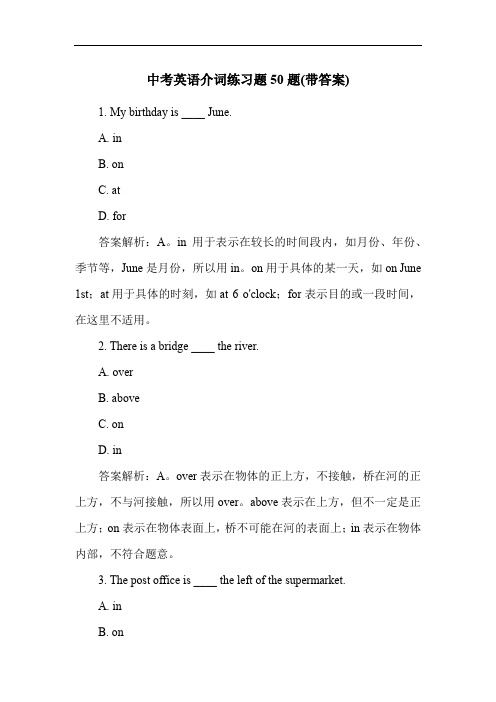介词练习题带答案
- 格式:doc
- 大小:54.00 KB
- 文档页数:6

六年级英语介词短语练习题20题(带答案)1. My schoolbag is ____ the table in my bedroom.A. onB. inC. underD. above答案解析:A。
“on”表示在物体的表面之上,这里说书包在卧室的桌子上,是在桌子表面,所以用“on”。
“in”表示在物体内部,书包不在桌子内部,所以B选项错误。
“under”表示在物体下方,与题意不符,C选项错误。
“above”表示在上方,但不一定是正上方且不接触,这里描述书包在桌子上,通常是接触的表面关系,所以D选项错误。
2. We have English class ____ 9:00 in the morning.A. atB. onC. inD. for答案解析:A。
“at”用于具体的时刻前面,9:00是具体的时刻,所以用“at”。
“on”用于具体的日期或者特定的某天上午、下午、晚上,这里不是日期,B选项错误。
“in”用于年、月、季节或者泛指的上午、下午、晚上,C选项错误。
“for”表示持续一段时间,不符合题意,D 选项错误。
3. There are many trees ____ our school.A. in front ofB. in the front ofC. at the front ofD. front of答案解析:A。
“in front of”表示在物体外部的前面,树在学校外部的前面,所以用“in front of”。
“in the front of”表示在物体内部的前面,比如教室内部的前面,这里树不在学校内部,B选项错误。
没有“at the front of”这种用法,C选项错误。
“front of”缺少介词,是错误表达,D选项错误。
4. I often play football ____ the weekend.A. atB. onC. inD. for答案解析:A。
“at the weekend”是固定搭配,表示在周末。

三年级英语介词at、in、on的用法练习题30题(带答案)1. I have breakfast ____ 7 o'clock every morning.A. atB. inC. on答案解析:A。
“at”用于具体的时刻前,“7 o'clock”是具体的时刻,所以用“at”。
“in”一般用于表示较长的时间段,如“in the morning”(在上午),但不用于具体的时刻;“on”用于具体的日期或星期几等,这里不是日期或星期几,所以不能用“on”。
2. We go to school ____ the morning.A. atB. inC. on答案解析:B。
“in the morning”是固定搭配,表示在上午。
“at”用于具体时刻,这里“morning”不是具体时刻;“on”用于具体日期或星期几等,不用于表示上午这个时间段。
3. My birthday is ____ May.A. atB. inC. on答案解析:B。
“in”用于月份前,“May”是五月,是月份,所以用“in”。
“at”用于具体时刻,不用于月份;“on”用于具体日期或星期几等,这里不是具体日期,不能用“on”。
4. She has a party ____ Saturday.A. atB. inC. on答案解析:C。
“on”用于星期几前,“Saturday”是星期六,所以用“on”。
“at”用于具体时刻,不用于星期几;“in”用于较长时间段,不用于星期几。
5. They play football ____ the afternoon.A. atB. inC. on答案解析:B。
“in the afternoon”是固定搭配,表示在下午。
“at”用于具体时刻,这里“afternoon”不是具体时刻;“on”用于具体日期或星期几等,不用于表示下午这个时间段。
6. He goes to bed ____ 9:30.A. atB. inC. on答案解析:A。

中考英语介词练习题50题(带答案)1. My birthday is ____ June.A. inB. onC. atD. for答案解析:A。
in用于表示在较长的时间段内,如月份、年份、季节等,June是月份,所以用in。
on用于具体的某一天,如on June 1st;at用于具体的时刻,如at 6 o'clock;for表示目的或一段时间,在这里不适用。
2. There is a bridge ____ the river.A. overB. aboveC. onD. in答案解析:A。
over表示在物体的正上方,不接触,桥在河的正上方,不与河接触,所以用over。
above表示在上方,但不一定是正上方;on表示在物体表面上,桥不可能在河的表面上;in表示在物体内部,不符合题意。
3. The post office is ____ the left of the supermarket.A. inB. onC. atD. to答案解析:B。
on the left/right of是固定搭配,表示在某物的左边/右边。
in表示在内部;at表示在小地点;to表示在某个方向上,不强调左右关系。
4. She usually gets up ____ six o'clock.A. inB. onC. atD. for答案解析:C。
at用于具体的时刻,six o'clock是具体的时刻,所以用at。
in用于较长时间段;on用于具体某一天;for表示目的或一段时间,均不符合题意。
5. We will go to Paris ____ next week.A. inB. onC. atD. /答案解析:D。
next week前不需要加介词,表示将来的时间。
in 用于较长时间段;on用于具体某一天;at用于具体时刻,都不符合这里的用法。
6. The cat is hiding ____ the table.A. underB. belowC. inD. on答案解析:A。

中考英语介词短语练习题40题含答案解析1.She often does her homework ____ evening.A.in theB.at theC.on theD.in答案解析:A。
in the evening 是固定搭配,表示“在晚上”。
B 选项at the evening 错误搭配;C 选项on the evening 通常用于具体某一天的晚上;D 选项in 单独使用不完整。
2.We have a music class ____ Wednesday afternoon.A.inB.onC.atD.of答案解析:B。
on Wednesday afternoon 表示“在周三下午”,具体某一天的上午、下午、晚上用on。
A 选项in 用于一段时间,如in the morning;C 选项at 用于具体时刻;D 选项of 表示所属关系,不符合题意。
3.My father usually goes to work ____ seven o'clock.A.inB.onC.at答案解析:C。
at seven o'clock 表示“在七点”,具体时刻用at。
A 选项in 用于一段时间;B 选项on 用于具体某一天或某一天的上午、下午、晚上;D 选项for 表示一段时间,用于完成时态。
4.I was born ____ 2008.A.inB.onC.atD.to答案解析:A。
in 2008 表示“在2008 年”,年份用in。
B 选项on 用于具体某一天;C 选项at 用于具体时刻;D 选项to 表示方向等,不符合题意。
5.He arrived ____ the airport ____ five o'clock.A.at,inB.in,atC.at,atD.in,in答案解析:C。
arrive at 后接小地点,如airport;at five o'clock 表示“在五点”。

人教版高考英语介词练习题50题【含答案解析】1. In the field of scientific research, many new discoveries are made ______ the cooperation of different teams.A. withB. byC. forD. at答案:A。
解析:with表示“通过、借助(某种工具、手段或人的帮助)”,在这里表示通过不同团队的合作而有新发现,用法正确。
by表示“被、由”,通常引出动作的执行者,如果用by则强调是不同团队做出这些发现,不符合语境。
for表示“为了、对于”,at表示“在(某个地点、时间点等)”,这两个介词放在此处语义不通。
2. During the cultural exchange program, the students learned a lot ______ the local artists.A. fromB. toC. ofD. in答案:A。
解析:learn from是固定搭配,表示“向......学习”,在这里表示学生向当地艺术家学习很多东西,用法正确。
to表示方向等多种含义,of表示所属关系,in表示在......里面或在某个范围等,这几个介词放在此处不符合这个短语的搭配要求。
3. When traveling ______ Paris, you can't miss the Eiffel Tower.A. toB. inC. atD. on答案:B。
解析:in表示在某个大的地点(城市、国家等)内部,在这里表示在巴黎旅行,用法正确。
to表示朝着某个方向去,通常是动态的,这里不是强调去巴黎的过程而是在巴黎旅行这个状态,所以to不合适。
at表示在小地点或者某个具体的点,Paris是城市,用at不合适。
on表示在......上面(表面接触),不符合语境。
4. The new species was named ______ the scientist who first discovered it.A. afterB. forC. withD. by答案:A。

高中英语介词短语练习题40题【含答案解析】1. The Second World War broke out ____ 1939.A. inB. onC. atD. for答案解析:A。
“in”用于表示较长的时间段,如年、月、季节等,“1939”是年份,所以用“in”。
“on”用于具体的某一天,如“on Monday”“on May 1st”。
“at”用于具体的时刻,如“at 7 o'clock”。
“for”通常用于表示一段时间,常与完成时态连用,在这里不符合题意。
2. My sister usually gets up ____ six o'clock every morning.A. inB. onC. atD. to答案解析:C。
“at”用于具体的时刻点,“six o'clock”是具体的时刻,所以用“at”。
“in”用于较长时间段,“on”用于具体某一天,“to”表示方向等,不符合此处用法。
3. We will have a party ____ the evening of Christmas.A. inB. onC. atD. for答案解析:B。
“on”用于具体某一天的上午、下午或晚上,“the evening of Christmas”指的是圣诞节当天的晚上,所以用“on”。
“in”用于泛指的上午、下午、晚上,如“in the morning”。
“at”用于具体时刻,“for”表示目的等不符合。
4. The meeting will be held ____ a week.A. inB. onC. atD. for答案解析:A。
“in”用于表示将来的一段时间之后,“in a week”表示一周之后,会议将在一周之后举行。
“on”用于具体某天,“at”用于具体时刻,“for”表示持续一段时间,这里不是持续的意思。
5. They went to Paris ____ spring last year.A. inB. onC. atD. for答案解析:A。
四年级英语介词练习题40题(带答案)1. The book is ____ the desk.A. onB. inC. underD. behind答案:A。
解析:“on”表示在物体的表面之上。
在这个句子里,书在桌子的表面,所以用“on”。
“in”表示在物体内部,书不在桌子内部,所以B选项不符合。
“under”表示在物体下方,“behind”表示在物体后面,都不符合书在桌子表面这个情境。
2. The football is ____ the tree.A. next toB. betweenC. overD. above答案:A。
解析:“next to”表示紧挨着。
足球在树的旁边,用“next to”合适。
“between”用于两者之间,这里没有提及两者,所以B选项错误。
“over”和“above”都表示在上方,但更强调垂直上方且不接触,足球不可能在树的垂直上方且不接触,所以C和D选项不符合。
3. My schoolbag is ____ my chair.A. besideB. insideC. outsideD. far from答案:A。
解析:“beside”表示在旁边。
书包在椅子旁边,符合情境。
“inside”表示在里面,书包不在椅子里面。
“outside”表示在外面,但没有明确表示位置关系。
“far from”表示离得远,这里没有体现距离远,所以不选。
4. The teacher stands ____ the blackboard.A. in front ofB. in the front ofC. at the frontD. front of答案:A。
解析:“in front of”表示在物体外部的前面。
老师站在黑板的前面,是在黑板这个物体的外部前面,所以用“in front of”。
“in the front of”表示在物体内部的前面,比如在教室内部的前面部分,不符合这里的情境。
初一英语介词练习题40题(答案解析)1.I often get up ____ six in the morning.A.atB.onC.in答案解析:A。
“at”用于具体的时刻前,“six”是具体的时刻,所以用“at”。
“on”用于具体的日期、星期几等,“in”用于较长的时间段,如年、月、季节等。
2.My birthday is ____ May.A.atB.onC.in答案解析:C。
“in”用于较长的时间段,“May”是月份,属于较长的时间段,所以用“in”。
“at”用于具体的时刻,“on”用于具体的日期、星期几等。
3.We have an English class ____ Monday morning.A.atB.onC.in答案解析:B。
“on”用于具体的日期、星期几、具体某一天的上午/下午/晚上,“Monday morning”是具体某一天的上午,所以用“on”。
“at”用于具体的时刻,“in”用于较长的时间段。
4.She was born ____ 2008.A.atB.onC.in答案解析:C。
“in”用于较长的时间段,“2008”是年份,属于较长的时间段,所以用“in”。
“at”用于具体的时刻,“on”用于具体的日期、星期几等。
5.I usually do my homework ____ the evening.A.atB.onC.in答案解析:C。
“in”用于较长的时间段,“the evening”是较长的时间段,所以用“in”。
“at”用于具体的时刻,“on”用于具体的日期、星期几等。
6.They have a party ____ Saturday evening.A.atB.onC.in答案解析:B。
“on”用于具体的日期、星期几、具体某一天的上午/下午/晚上,“Saturday evening”是具体某一天的晚上,所以用“on”。
“at”用于具体的时刻,“in”用于较长的时间段。
四年级英语介词for、with、to的用法练习题20题(带答案)1.This present is for you.A.toB.withC.for答案解析:C。
本题考查介词for 的用法,表示对象是“你”。
选项A“to”表示方向,不符合题意;选项B“with”表示伴随,也不符合题意。
2.I bought a book for my friend.A.toB.withC.for答案解析:C。
这里表示目的是为了“我的朋友”买了一本书,用介词for。
选项A“to”通常表示方向或动作的对象,这里不合适;选项B“with”表示伴随,不符合语境。
3.She made a cake for her mother.A.toB.withC.for答案解析:C。
表示为“她的妈妈”做了一个蛋糕,用for。
选项A“to”表示方向等,这里不对;选项B“with”表示用某种工具或伴随,不适合此处。
4.I sing a song for my teacher.A.toB.withC.for答案解析:C。
为“我的老师”唱歌,用for。
选项A“to”一般指方向等,不符;选项B“with”表示伴随等,不合适。
5.He drew a picture for his sister.A.toB.withC.for答案解析:C。
为“他的妹妹”画了一幅画,用for。
选项A“to”表示方向等,不恰当;选项B“with”表示伴随等,不符。
6.I made a card for Christmas.A.toB.withC.for答案解析:C。
为圣诞节做了一张卡片,用for 表示目的。
选项A“to”不合适;选项B“with”表示伴随等,不符合。
7.She cooked dinner for her family.A.toB.withC.for答案解析:C。
为“她的家人”做晚饭,用for。
选项A“to”表示方向等,不对;选项B“with”表示伴随等,不合适。
高中英语介词短语练习题40题(带答案)1. I often study English in the morning, but yesterday I did it ______ the afternoon.A.atB.onC.inD.during答案解析:C。
“in the afternoon”是固定搭配,表示在下午。
A 选项“at”通常用于具体的时间点,如“at six o'clock”;B 选项“on”用于具体的某一天或者某一天的上午、下午、晚上,如“on Sunday afternoon”;D 选项“during”表示在……期间,后面通常接一段时间,如“during the summer vacation”。
2. We will have an exam ______ next week.A.inB.onC.atD.for答案解析:A。
“in+一段时间”表示在……之后,通常用于将来时。
B 选项“on”用于具体的某一天或者某一天的上午、下午、晚上;C 选项“at”通常用于具体的时间点;D 选项“for”表示持续一段时间。
3. I haven't seen my friend ______ a long time.A.forB.sinceC.inD.during答案解析:A。
“for+一段时间”表示持续一段时间。
B 选项“since”后面通常接时间点,表示从……以来;C 选项“in”通常用于将来时,表示在……之后;D 选项“during”表示在……期间。
4. The sports meeting will be held ______ Friday afternoon.A.inB.onC.atD.to答案解析:B。
“on+具体的某一天的上午、下午、晚上”,这里是“on Friday afternoon”。
A 选项“in”通常用于年、月、季节等;C 选项“at”通常用于具体的时间点;D 选项“to”通常表示到……。